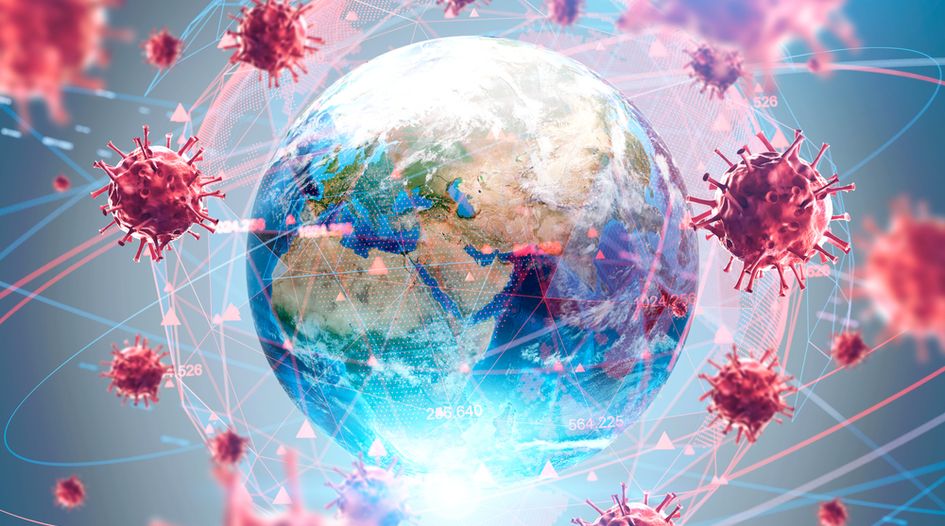Covid-19 emergency means the work of trademark counsel is more important than ever

In the upcoming issue of WTR, available to subscribers online in early April, we present analysis of the most recent Brand Finance Global 500, which makes ominous reading – sluggish growth and covid-19 suggesting that brand values could be on the verge of a collapse. That piece was written before the coronavirus emergency worsened and Brand Finance has subsequently issued analysis predicting that companies are likely to lose up to €1 trillion in brand value as a direct impact of the outbreak.
Among its predictions are that brands in the aviation, oil and gas, tourism and leisure, restaurants, and retail industries will be hardest hit, and that the top 100 European brands are estimated to drop 13% in value following the impact of covid-19.
It isn’t all gloom and doom. Home delivery apps, online video conferencing platforms and digital media have all seen surges in demand as a result of the remote working revolution. But clearly, these are unprecedented times. David Haigh, CEO of Brand Finance, comments: "The COVID-19 pandemic is now a major global health threat and its impact on global markets is very real. Worldwide, brands across every sector need to brace themselves for the Coronavirus to massively affect their business activities, supply chain and revenues in a way that eclipses the 2003 SARS outbreak. The effects will be felt well into 2021.”
At a time when brand value is under pressure, positive perception and reputation become paramount. Companies that are perceived to do the right thing, in the right way and for the right reasons, will be those that emerge strongest. What is clear is that not all companies are being perceived in this way.
This week has seen a backlash against a number of companies. Without wishing to be UK-centric, one example is the owner of pub-chain Wetherspoons coming under fire after telling staff, in the wake of pub closures, that they could take jobs with supermarkets following delays to pay. Yesterday, the company announced that it would be paying its staff, but already there were reports of pubs being vandalised and social media calls for a boycott.
On the flip side, some brands are acting as more positive forces, whether through:
- the supply of essential products (eg, companies in the fashion and textiles industries seeking to supply face masks and hospital gowns, and Prada donating intensive care units to a Milan hospital);
- informational messaging (eg, Google launching a covid-19 information and resources platform); or
- donations – either to research (eg, Dolce & Gabbana’s funding of studies into covid-19 by Humanitas University) or to particular communities (eg, Netflix’s £1 million donation to the newly established Covid-19 Film and TV Emergency Relief Fund).
Of course, not all companies are able, or have the platforms, to engage in such activities. Many are focused on survival and the future of existing staff. But it is a reminder of the role that brands can play when wider society is faced with such a challenge as now – a role that can be big or small.
Like many of my peers, colleagues and friends in the trademark (and IP media) community, I am currently working from home, which as of two years ago is a small commuter town outside London. Last week, before the UK government instructed schools up and down the country to shut, a representative from healthcare company GSK – which has a sizable presence in the area – attended my son’s nursery to talk to the children. He explained about germs, showed slides and led an interactive, educational ‘how to wash your hands’ game. It was an unpublicised visit, and one that would have gone unnoticed to me had I not happened to do the nursery run that day. It got me thinking about the role that GSK plays locally, even when under the radar, and how brands can be a positive force in the community.
What is for sure is that when the global community is reacting to a pandemic, and brand value is under pressure, reputation and brand strength truly matter. This makes the work of trademark professionals more important than ever. While counsel may not be involved in the decision-making on corporate responses, they have an important role to play in these efforts. First, there is the monitoring of brand discussions online to help prevent misuse. Many will be involved in advertising and marketing messaging clearance. Making the right enforcement decisions is also critical – when to swing into action (particularly if the brand is being used to dupe customers or peddle counterfeit goods seeking to capitalise on the concern surrounding covid-19) and when to let things go. All of these activities play into external perceptions of the brand. INTA has long preached the gospel of trademark counsel being brand ambassadors. Now that mission is particularly important.


